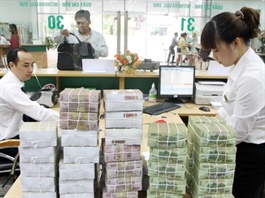Government to ask for parliament's approval on global minimum tax
Government to ask for parliament's approval on global minimum tax
The global minimum tax will affect multinationals such as Samsung, Intel, LG, Bosch, Sharp, Panasonic, Foxconn and Pegatron, among other investors in Vietnam.
The government of Vietnam is planning to submit a proposal to the National Assembly in October for the introduction of a global minimum tax.

Electronics production at Katolec Vietnam in Quang Minh Industrial Cluster, Hanoi. Photo: Pham Hung/The Hanoi Times |
The intended timeframe for its enforcement is early 2024, the General Department of Taxation announced.
In June 2021, the G7 countries reached an agreement to combat tax avoidance by multinational corporations by introducing a global minimum tax. This tax will come into effect on January 1, 2024, and apply to multinational companies with a total turnover of EUR750 million (US$800 million). The agreed tax rate is set at 15%.
Dang Ngoc Minh, Deputy Director General of the General Department of Taxation, said the Ministry of Finance submitted a report to the Government in June on implementing regulations to prevent global tax base erosion in Vietnam. The Government plans to submit this tax proposal to the National Assembly for review and approval in October, which is scheduled to come to effort early next year.
The National Assembly will set a policy for a global minimum tax that will include the Income Inclusion Rule (IIR) and the Quota of Deductible Modified Taxable Turnover (QDMTT).
The QDMTT concept involves the use of a domestic mechanism that aligns the calculation of residual profits and the minimum tax with OECD rules. The purpose of this mechanism is to prevent foreign direct investment (FDI) companies from paying additional taxes only in the countries where their parent companies are based.
Economies such as Hong Kong, Singapore, and Malaysia are also considering similar measures and are likely to adopt them.
Minh said these regulations would be localized in Vietnam to ensure compliance with model regulations and guidelines outlined in a global program to combat base erosion and profit shifting (BEPS).
"The draft regulation will undergo extensive consultations with the business community, ministries, and other relevant agencies before being submitted to the National Assembly," Minh said.
According to the Ministry of Finance, there are currently 1,015 foreign direct investment (FDI) enterprises in Vietnam whose parent companies are subject to such taxation. Of these, more than 70 enterprises are expected to be affected by the implementation of the global minimum tax in 2024. If the home countries of these parent companies enforce this tax, they would collectively collect an additional tax difference of approximately VND12 trillion (US$507 million) in 2024.
The General Department of Taxation has revealed that about 335 projects operating in economic zones and industrial zones, especially in the processing and manufacturing sectors, benefit from tax incentives that result in a corporate income tax rate of less than 15%.
Notably, companies such as Samsung, Intel, LG, Bosch, Sharp, Panasonic, Foxconn, Pegatron, and others, with a combined registered investment capital of nearly 30% of the total FDI in Vietnam (or approximately $131.3 billion), are among those that may be affected by the implementation of the global minimum tax.























